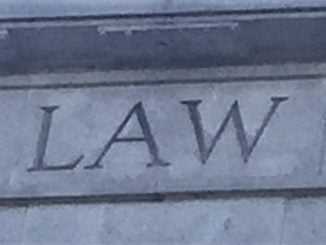RALEIGH — A motion filed by the attorney for state lawmakers in the long-running Leandro education funding case was granted by the N.C. Court of Appeals.
The motion, filed by Matthew Tilley on Sept. 18, asked for a 30-day extension in filing “for the Intervenor Defendants-Appellants to file and serve their opening brief.” The court of appeals granted the motion the same day.
The Intervenor Defendant-Appellants, which include Senate Leader Phil Berger (R-Eden) and House Speaker Tim Moore (R-Kings Mountain), are appealing the $677.8 million funding order issued in April by Superior Court Judge James Floyd Ammons Jr. in the above-referenced matter.
The opening brief for the appeal was originally to be due Sept. 25. The extension granted by the court of appeals pushes that due date out to Oct. 25.
The Leandro case started in 1994 and has passed through various courtrooms and been overseen by four judges over the last two decades.
The case was first assigned to Superior Court Judge Howard Manning in 1997. Manning was replaced by W. David Lee in Oct. 2016 by then-N.C. Supreme Court Chief Justice Mark Martin.
In March 2022, N.C. Supreme Court Chief Justice Paul Newby assigned the case to Superior Court Judge Mike Robinson to replace Lee, who passed away in October 2022 after a battle with cancer. Months later, on Dec. 29, Newby reassigned the case to the Ammons after Robinson requested the case be removed from his docket, citing workload issues.
The core of the case, filed by parents and students in low-wealth counties, alleged the right to a decent and proper education under the N.C. Constitution was being denied.
In 1997, the N.C. Supreme Court’s ruling in the case sent it back to the trial court level. Another ruling by the state’s high court in 2004 took a look specifically at topics pertaining to Pre-K education and at-risk students, but no funding directive was issued at that time.
In more recent events in the Leandro timeline, the funding has gone from $1.7 billion to $785 million down to the current estimated total of $677.8 million.
Lawyers for Berger and Moore have indicated they want the state’s high court to review the case again. The upcoming October brief or a future motion could contain such a request. If the high court does take the case back up, the constitutional issue of the funds transfer created by the previous court’s ruling will likely resurface.
Recent Highlights of the Leandro Case
November 2021: Judge Lee orders three state agencies to go around the legislature to transfer $1.7 billion in funds from the state’s coffers to fulfill the court-approved remedial plan produced by WestEd. Lee’s order directs the transfer to occur within 30 days and be conducted by the agency heads of the Office of the State Budget and Management, the Office of the State Comptroller, and the Office of the State Treasurer to turn over the money from the state’s coffers. Notably, up until this point, the state controller’s office and the treasurer’s office have never before been involved in the Leandro case.
December 2021: The Court of Appeals blocks the $1.7 billion funding order issued by Lee. The appeals court questions the authority of the three agencies cited in Lee’s order to transfer the funds as unconstitutional. The appeals ruling also argues that if Lee’s order is fulfilled it would create ongoing problems and threaten the separation of powers between the branches of North Carolina government.
Aug. 31, 2022: The state Supreme Court, which at that time was held by a Democrat majority, hears oral arguments. The main question discussed throughout the hearing was whether the courts can bypass the state constitution when it comes to appropriating taxpayer money for education purposes. Earlier in the year, the high court took the case away from a lower court and fast-tracked it.
November 2022: In a 4-3 decision, the Democrat-controlled Supreme Court pushes the funding order through on Nov. 4, just days before the 2022 midterm elections. Penned by retiring Associate Justice Robin Hudson, the bulk of the majority opinion is spent justifying the forced transfer of funds at odds with the state constitution in what Hudson calls an “extraordinary remedy.”
Associate Justice Phil Berger Jr. authored the dissent and argued the case isn’t about education or money but about “power.” The dissent refuted the majority opinion as “the arbitrary usurpation of purely legislative power by four justices” and cited multiple past cases heard by the high court that the Leandro opinion undermined the court’s own past rulings, including the recent ruling in Cooper v. Moore in which the majority opinion affirmed the General Assembly has “exclusive” control of expenditures under the state’s appropriation clause.
December 2022: Chief Justice Newby reassigns the case to Judge Ammons after receiving a request to do so from Judge Robinson. Prior to Ammons taking up the case, Chief Deputy Director of the State Budget Anca Elena Grozav issued a transfer amount estimate of $677.8 million, roughly $108.8 million less than the $785 million total submitted by Robinson the year before.
March 2023: The Supreme Court grants a motion made by then-State Controller Linda Combs and reinstates a 2021 Writ of Prohibition issued by the Court of Appeals halting a lower court’s order directing the transfer of funds in the case. The March 3 ruling said the controller “has made a sufficient showing of substantial and irreparable harm should the stay remain in effect,” restoring the writ “until this Court has an opportunity to address the remaining issues in this case.”
April 2023: Ammons issues a 12-page order affirming Grosav’s total of $677.8 million. Lawmakers had recently put forth a figure of around $376 million. Attorneys for legislative leaders had submitted more than $48 million in credits for spending in five areas to bring down the overall total that Ammons rejected.



